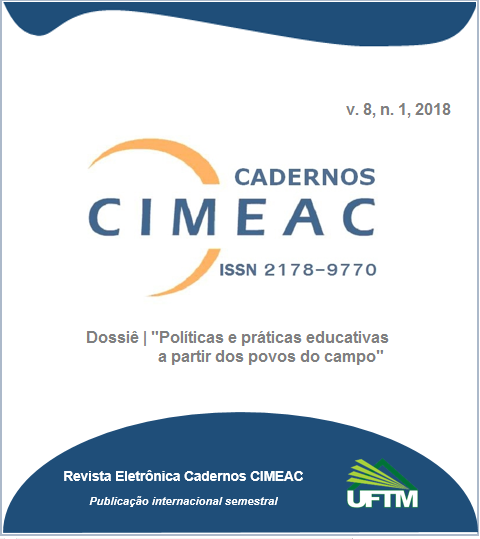O estágio supervisionado e a pedagogia da alternância: caminhos que se cruzam na formação do professor do campo / Internship and the pedagogy of alternation: paths that cross...
DOI:
https://doi.org/10.18554/cimeac.v8i1.2867Resumen
O presente trabalho propõe discutir as contribuições do Estágio e da Pedagogia da Alternância para a formação de futuros professores no curso de Licenciatura em Educação do Campo da Universidade Federal de Goiás – Regional Goiás. Em um primeiro momento, procurou-se refletir sobre a Educação do Campo e a Alternância; em seguida, discute-se o Estágio e a formação docente e, ao final, faz-se um recorte para o desenvolvimento do Estágio dentro da proposta de Alternância do curso mencionado. Buscou-se conhecimento de diferentes autores, como Pimenta, Molina, Freire, Arroyo, Silva, dentre outros, e também em diversos documentos, tais como: Projeto Pedagógico do Curso e Regulamento de Estágio do curso estudado, Leis, Pareceres, Decretos, entre outros. Trata-se de pesquisa qualitativa, na modalidade de pesquisa bibliográfica e pesquisa documental. A Alternância no curso é desenvolvida em Tempo Universidade e Tempo Comunidade, de modo em que ambos os tempos e os espaços de formação são contemplados elementos do Estágio. Deste modo, esta articulação favorece a reflexão crítica sobre a realidade das escolas do campo e ressignifica os saberes docentes dos futuros profissionais da educação.
Palavras-chave: Estágio; Pedagogia da Alternância; Educação do Campo; Professor do Campo.
ABSTRACT: The present work proposes to discuss the contributions of the Stage and the Alternation Pedagogy for the training of future teachers in the course of Licenciatura in Education of the Field of the Federal University of Goiás - Regional Goiás. At first, an attempt was made to reflect on the Education of the Field and Alternation; then the stage and the teacher training are discussed and, at the end, a cut is made for the development of the stage within the proposed Alternation of the mentioned course. It was sought knowledge of different authors, such as Pimenta, Molina, Freire, Arroyo, Silva, among others, and also in several documents, such as: Pedagogical Project of the Course and Regulation of Stage of the studied course, Laws, Sight, Decrees, among others. It is a qualitative research, in the form of bibliographic research and documentary research. The Alternation in the course is developed in Time University and Time Community, so that both times and the spaces of formation are contemplated elements of the Stage. In this way, this articulation favors the critical reflection on the reality of the field schools and re-signifies the teaching knowledge of the future professionals of the education.
Keywords: Supervised Stage; Alternation Pedagogy; Countryside education; Reflective Teacher.
Descargas
Publicado
Número
Sección
Licencia
Os autores que publicam nesta revista concordam com os seguintes termos:
(a) Não cobramos dos autores para a publicação neste periódico.
(b) Autores mantém os direitos autorais e concedem à revista o direito de primeira publicação, com o trabalho simultaneamente licenciado sob a Licença Creative Commons que permite o compartilhamento do trabalho com reconhecimento da autoria e publicação inicial nesta revista.
(c) Autores têm permissão e são estimulados a difundir e a distribuir a versão publicada de seu trabalho online (ex.: em repositórios institucionais ou na sua página pessoal) após o processo editorial, já que isso pode aumentar o impacto e a citação do trabalho publicado (Veja O Efeito do Acesso Livre).
* * *
AUTHORS COPYRIGHT AND PUBLISHING RIGHTS
Authors who publish with this journal agree to the following terms:
(a) This journal does not charge authors for publication.
(b) Authors retain copyright and grant the journal right of first publication with the work simultaneously licensed under a Creative Commons Attribution License that allows others to share the work with an acknowledgement of the work's authorship and initial publication in this journal.
(c) For authors whose articles have been accepted: authors are permitted and encouraged to post their work online (e.g., in institutional repositories or on their website) after the publication of the text in Cadernos CIMEAC, as it can lead to productive exchanges as well as earlier and greater citation of published work (See The Effect of Open Access).

 10.18554/cimeac
10.18554/cimeac

